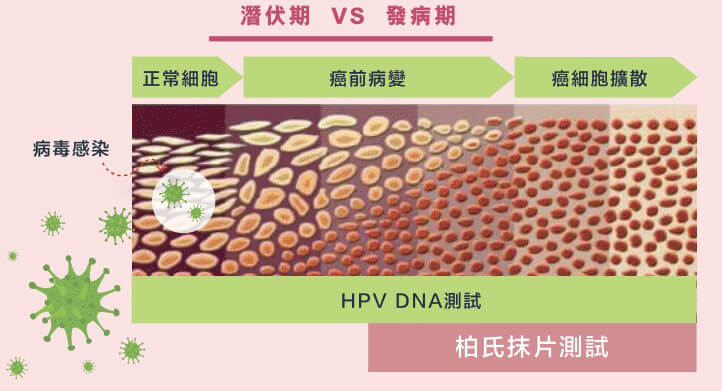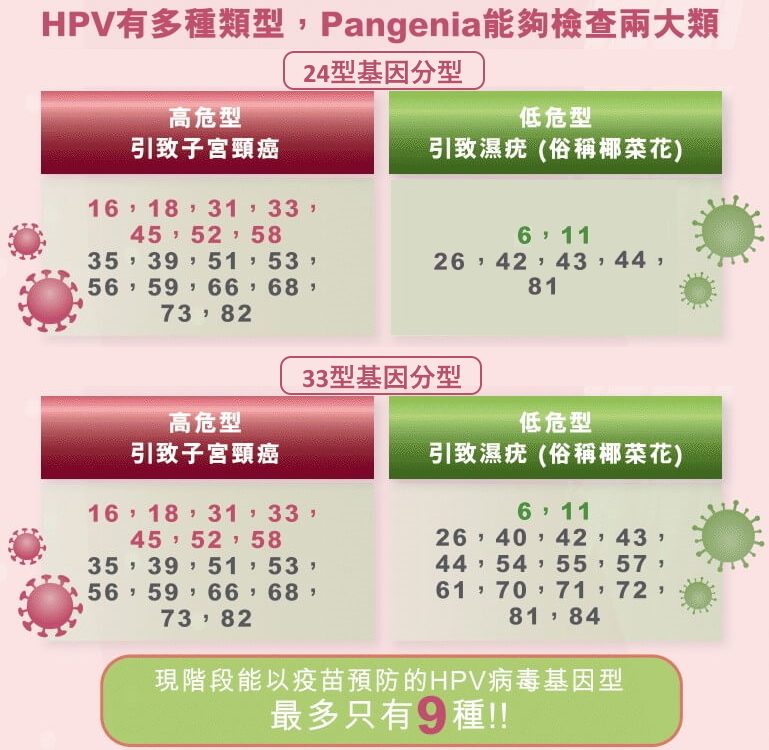What is cervical cancer?
According to the worldwide statistics,
| a woman dies of cervical cancer in every minutes* | |
| a woman is diagnosed with cervical cancer in every eight seconds# |
According to HKCaR’s statistics, cervical cancer is fourth most common cancer in women worldwide. From 2018, cervical cancer has caused over 2.7%+ of female cancer deaths. Studies states that over 90-91% cervical cancer are infected by HPV *.
More than 90-91% of cervical cancers are infected by HPV
The medical profession has confirmed that almost all cervical cancers (90-91%) are caused by persistent infection with Human Papillomavirus (HPV). Compared with low-risk HPV, persistent infection with high-risk HPV causes cervical cancers. The chance of causing cervical cancer is at least 30 times higher*. Therefore, we must first understand the cause of cancer before prevention of cervical cancer.
HPV Assessment Test are still necessary after taking HPV vaccines
According to World Health Organization’s cancer categories, HPV can be categorize as highly efficacious and low efficacious. High risk HPV is cervical cancers main cause; low risk HPV will cause genital warts.
After injecting vaccine, it is still possible being infected by HPV and causing serious cancers. Regular HPV assessment test is the only effective way to prevent cervical cancer.
USFDA approves HPV DNA assessments as cervical cancer’s first prevention
Cervical cells will mutate within a few years after infection and mutate to cervical cancers.
Doctors can evaluate mutating cells and conduct early treatment to prevent cervical cancer. HPV DNA screening can discover early stage HPV virus, confirm which cells is infected by HPV before mutation. HPV screening is extremely effective to prevent cervical cancer.
Pangenia HPV DNA screening test covers all HPV infection type
Pangenia provides the most comprehensive HPV test in Hong Kong. In addition to covering more than 200 rare HPV genotypes, 33 common clinical HPV genotypes will also be specially identified. Among the high-risk types, in addition to the most widely recognized genotypes 16, 18, the coverage also includes another 17 high-risk virus genotypes, such as the most popular genotypes 45, 52, 58 in Hong Kong.
Pangenia HPV DNA screening effectively decreases cervical cancer assessment’s false negative rate.
Although Pap test has been adapted and proved success of screening cervical cancer for years, its false negative rate is still a major concern. From statistics, nearly 1/3 cervical cancer patient resulted in false negative rate. Pangenia HPV DNA genetic screening sensitivity reaches 98% which provide a more accurate screening. Therefore, the most effective method of preventing cervical cancer is to regularly carry out both HPV DNA screening test and Pap test.
Test Specifications
| Test Code | Methodology | Specimen Requirements | Turnaround Time |
|---|---|---|---|
| IHC | DNA Flow-through hybridization | Cervical brushing in 20 mL ThinPrep or 10 mL SurePath | 2 working days |
| IHF | DNA Flow-through hybridization | Cervical brushing in 20 mL ThinPrep or 10 mL SurePath | 3 working days |
Sample requirements and handling instruction
| Sample Type | Sample Collection |
|---|---|
| Liquid-based cytology specimen | Samples should be collected using a cervical broom and placed in liquid-based cytology preservative. |
Storage instruction
| Specimen should be kept at room temperature. |
Rejection criteria
| Specimen without proper labeling | |
| Specimen not in requested format or insufficient quantity | |
| Specimen in expired container | |
| Container leakage | |
| Sampling date is more than 14 days | |
| Test request form without / with mismatched patient identification information |
Factor(s) known to affect results
| Improper collection, handling and storage of specimen | |
| Inadequate specimen |
Accreditations
Our HPV DNA genotyping test reports are reviewed and signed by certified medical lab technologist.
Reference
- * http://globocan.iarc.fr/old/FactSheets/cancers/cervix-new.asp
- # https://www.analcancerfoundation.org/about-hpv/hpv-facts-and-figures/
- + https://www.chp.gov.hk/tc/healthtopics/content/25/56.html






